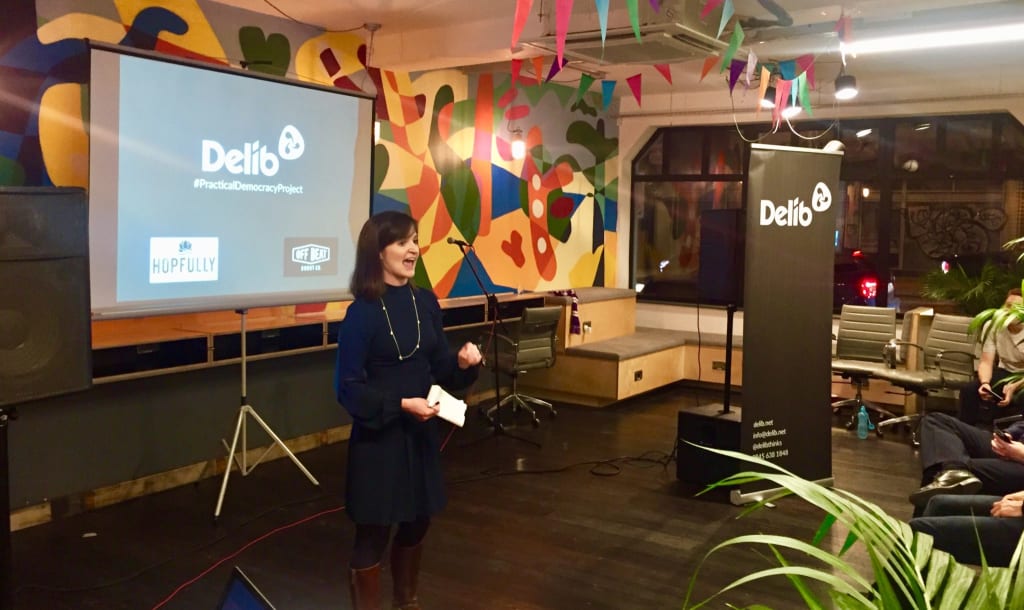 After the success of taking the Practical Democracy Project around the UK and to New Zealand, we decided it was about time we took it to our neighbours across the Irish sea. Some of the Delib team descended on the very cool Tara Building in Dublin on October 24th for an evening event of democracy-related chat, drinks from Hopfully Brewing and donuts from Offbeat.
After the success of taking the Practical Democracy Project around the UK and to New Zealand, we decided it was about time we took it to our neighbours across the Irish sea. Some of the Delib team descended on the very cool Tara Building in Dublin on October 24th for an evening event of democracy-related chat, drinks from Hopfully Brewing and donuts from Offbeat.
We were delighted to have some brilliant speakers along. Sharon Waters and Rory Harte joined us from European Movement Ireland to present on their Future of Europe project and we also had Anthony Zacharzewski there from the Democratic Society talking all about the importance of deliberative forms of democracy.
 I kicked off with some Practical Democracy Project history. This was our 6th main event and we also had our smaller meetup in Bristol earlier this month so it was a good opportunity to take stock and fill people in on why we started doing these events. With each event, different themes emerge but so far they have fallen along similar lines:
I kicked off with some Practical Democracy Project history. This was our 6th main event and we also had our smaller meetup in Bristol earlier this month so it was a good opportunity to take stock and fill people in on why we started doing these events. With each event, different themes emerge but so far they have fallen along similar lines:
- People want to participate in democratic processes, but sometimes the barriers to entry are too high
- Citizens want to know that when they do participate, they’re actually being listened to and not just shouting into the void
- Tech is a massive opportunity to improve things in this area as long as you keep the participant in mind and make it a means to helping them – it’s important to make sure that tech doesn’t become another barrier
- Success comes from governments working with citizens, not without them
It’s clear that participation in political issues is high in Ireland, as demonstrated by the referendums on gay marriage and abortion, so we were enthusiastic about getting to Ireland and seeing what people had to say.
Sharon Waters and Rory Harte – European Movement Ireland
After my recap, Sharon was up next to tell us all about the Future of Europe project. The project was a series of ‘citizen dialogues’ which provided an opportunity for people to give their views on how they feel about Ireland’s relationship with the European Union, and where they think it should go in the next 30 years. It is part of an EU-wide conversation and Phase 1 involved European Movement Ireland holding events around the country to feed into the discussion.
The events were really localised and included people from a range of organisations such as community groups, councils, universities and more. Sharon told us how no topic was untouchable – a man in Cork told people at his local event that every year on Europe Day he burns an EU flag outside City Hall and whilst that might not have been a popular opinion in the room, his contribution to the conversation was just as important as anyone else’s. She suggested that a grass-roots approach was a chance to push back on the ‘democratic deficit’ that some people may be feeling of late. They wanted to ensure that people felt listened to so a moderator would be present at each round table discussion to feed the conversation back.
The ultimate aim and outcome was for people’s voices to be included in their government’s Future of Europe submission. All attendees were sent the report from their event to ensure the feedback loop was closed and they felt truly included in the process. The project provided a great opportunity for people to participate in a conversation around issues that will affect them in the future.
After Sharon and Rory, we heard from Delib’s very own Ben Fowkes, who caught everyone up on a bit of the company’s history.
Anthony Zacharzewski – Democratic Society
After travel woes prevented Anthony from making it to our Bristol event in June, his luck proved better getting to Dublin and he came along to give everyone a brilliant talk on the importance of deliberative democracy.
 Having studied Athenian democracy at university, Anthony has always had a keen interest in the subject and has gone on to set up and run the Democratic Society (DemSoc), an organisation which works for ‘more and better democracy’, helping to give citizens opportunities to participate in decisions that affect them.
Having studied Athenian democracy at university, Anthony has always had a keen interest in the subject and has gone on to set up and run the Democratic Society (DemSoc), an organisation which works for ‘more and better democracy’, helping to give citizens opportunities to participate in decisions that affect them.
Anthony spoke of the social change he saw ‘bubbling up’ during his time at university, thanks in part to the advent of the internet. However, he argued that it’s not just innovation that brings about change, it’s also down to organisations like DemSoc and Delib who are working to help make that happen.
The ‘death of democracy’ is a widely covered topic at the moment and Anthony believes that the frustrations we may see from people boil down to a feeling that governments and politics aren’t always representative of the people they’re serving. You could fill bookshelves on the subject but Anthony says he wants to put a more positive message out there: we all agree that the world could be a better place, but we need to work together to work out how that plays out in practice. He is hopeful for future generations of leaders to come through and bring change with them; young people with key skills who can foster change and positivity throughout government, using digital to aid that.
A member of the audience asked how Anthony feels about citizens’ assemblies and he said that while politicians are often a little wary of them, they have been a clear success in Ireland and are a model that works. He feels it can be incredibly valuable to get people together to discuss issues that affect them and shows people that even when they are from very different walks of life they can still experience the same frustrations and reach similar conclusions of changes they hope to see. As long as issues are framed in a way that can speak to even the most disenfranchised of society, citizens’ assemblies and sortition panels can be a great way of ensuring participation from a wide pool of society, leading to better-informed decision-making from governments.
Ben rounded things off by asking Anthony “so, what’s next?” – to which he replied “no one really knows!”. He believes that the important thing is for teams of people who are working to make improvements to democratic processes (such as the DemSoc team, us here at Delib and other organisations around the world) to get together and share experiences, bringing locality to projects. There’s no single comprehensive model in our world for exactly what those improvement to democracy might be but there are some good folks working towards figuring that out.
As ever, it was fantastic to have the chance to take the Practical Democracy Project to a new place and learn more about how citizens engage with their government in Ireland. A huge thanks is in order for Molly at the Tara Building for all her help with the amazing venue and also to Hopfully Brewing and Offbeat Donuts for providing the beers and sweet treats.


